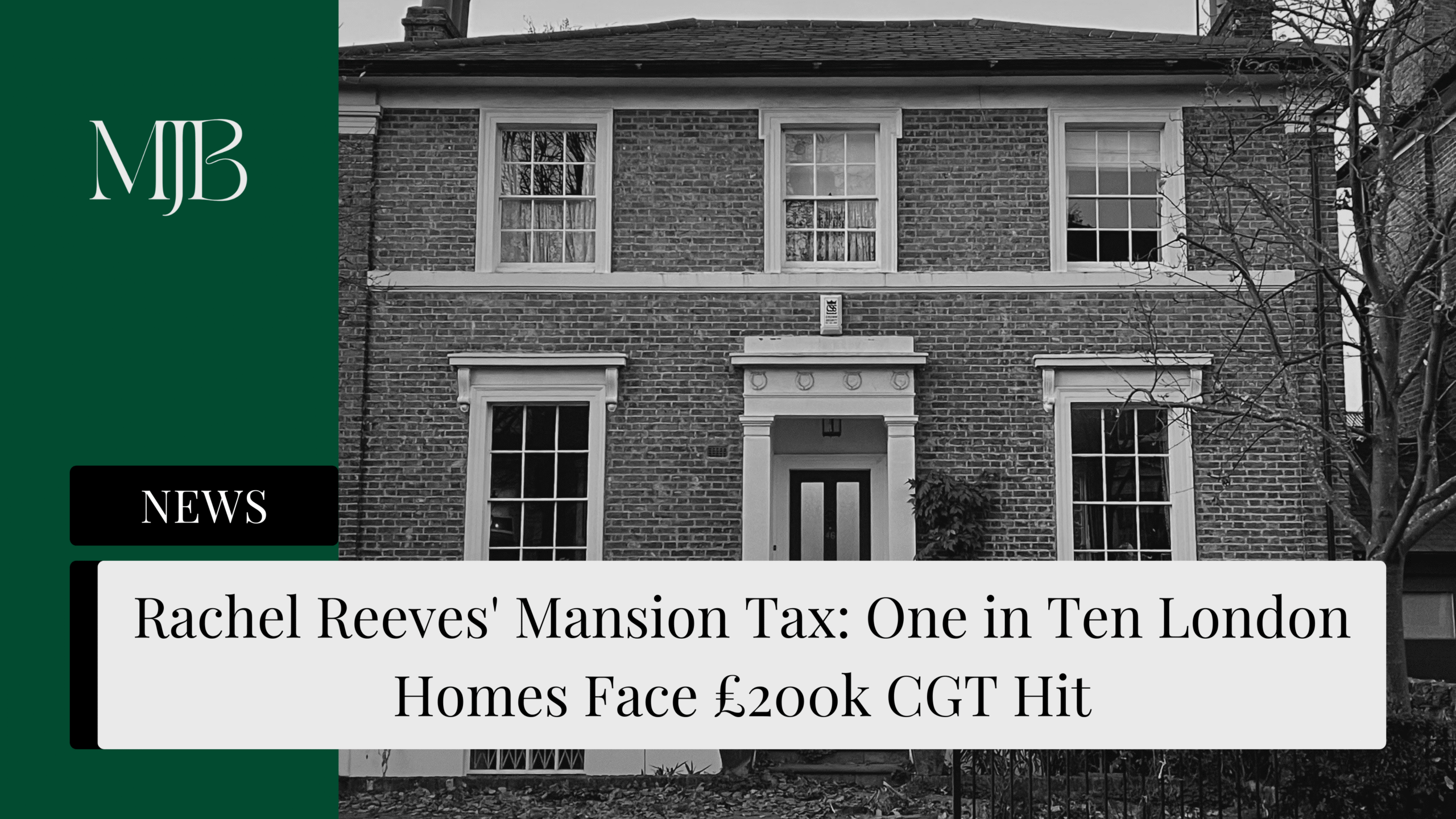Picture this: you’re sitting on a £2m London home, thinking you’ve made it. Then Chancellor Rachel Reeves drops a mansion tax bombshell that could cost you nearly £200k when you sell. Welcome to 2025’s biggest property tax shake-up.
New data reveals that 10.9% of London homes would be caught in the government’s proposed mansion tax net – that’s roughly one in ten properties facing capital gains tax on sales above £1.5m. Meanwhile, the rest of the UK? Just 1.6% of homes outside the capital would be affected.
Here’s everything property owners need to know about Rachel Reeves’ capital gains tax plans and why they’re sending shockwaves through London’s housing market.
What Is Rachel Reeves’ Mansion Tax Proposal?
The proposed levy would end private residence relief for properties above £1.5m, introducing capital gains tax on primary residences for the first time in UK history. We’re talking serious money:
- Higher-rate taxpayers: 24% CGT on property gains
- Basic-rate taxpayers: 18% CGT on gains
- Average tax bill: Around £199,973 for affected homeowners
- Implementation: Likely at the 2025 Autumn Budget
Treasury officials believe this £1.5m threshold would hit around 120,000 homeowners as Reeves seeks to fill a £40bn budget hole without raising income tax, National Insurance, or VAT.

London Property Market Takes the Biggest Hit
The numbers reveal this is essentially a London and South East tax:
- London: 10.9% of homes worth over £1.5m
- South East: Just 4.1% above the threshold
- Rest of UK: A tiny 1.6%
“It would predominantly be a tax on the most expensive areas of London and the South East,” confirms Colleen Babock from Rightmove. Three decades of price growth have created this stark regional divide.

Why Property Experts Are Raising Red Flags
Industry insiders aren’t holding back their concerns about Rachel Reeves’ capital gains tax plans. Babock warns this could “deter some moves at the upper end” in a London market already struggling with existing tax burdens.
Trevor Abrahmsohn from Glentree International is even blunter, calling it “another imposition, driven by politics of envy.” He argues it won’t generate quick Treasury cash and will simply discourage property sales.
The timing compounds the problem – combined with proposed stamp duty changes, London’s luxury market faces a potential “double whammy” of new taxes.
Market Distortion Concerns Around £1.5m Threshold
The £1.5m mansion tax threshold could create serious market distortions:
- Cliff-edge effect: Properties clustering just below £1.5m to avoid CGT
- Pricing distortions: Sellers pricing in the tax cost
- Reduced mobility: Fewer people willing to sell and move
- Downsizing deterrent: Older homeowners staying in larger homes
This contradicts Rachel Reeves’ stated goal of encouraging property market mobility through her previous CGT rate reductions.

What This Means for Property Owners
If you own London property above £1.5m, the mansion tax could fundamentally change your financial planning:
Immediate concerns:
- Calculate potential CGT liability on current property value
- Consider timing of any planned property sales
- Factor tax costs into downsizing decisions
Longer-term impacts:
- Reduced net proceeds from property sales
- Complicated inheritance planning
- Potential cash flow issues for forced sellers

The Bottom Line: Mansion Tax Reality Check
Rachel Reeves’ mansion tax represents the biggest shift in UK property taxation in decades. Affecting 1 in 10 London homes, the capital gains tax changes would fundamentally alter the economics of high-value property ownership.
The Chancellor faces a delicate balancing act: raising revenue without destroying London’s property market or breaking Labour’s tax promises to working people.
Stay ahead of property tax changes: Monitor Autumn Budget announcements and consider seeking professional tax advice if your property approaches the £1.5m threshold.
Frequently Asked Questions
Q1: When would Rachel Reeves’ mansion tax start?
A: The capital gains tax changes would likely be announced at the 2025 Autumn Budget and could take effect from April 2026. No official timeline has been confirmed by the Treasury.
Q2: How much mansion tax would I actually pay?
A: Officials estimate the average CGT bill would be around £199,973 for affected higher-rate taxpayers. The exact amount depends on your property’s gain since purchase and your income tax bracket.
Q3: Does the £1.5m threshold apply to the entire property value?
A: No, capital gains tax would only apply to the profit made above your original purchase price, not the full £1.5m sale value. However, the threshold determines whether CGT applies at all.
Q4: Could I sell just under £1.5m to avoid the tax?
A: Yes, properties sold below the £1.5m mansion tax threshold wouldn’t face this new CGT. However, this could create artificial market distortions around the threshold price.
Q5: What happens to second homes and buy-to-let properties?
A: Second homes and rental properties already face capital gains tax, so Rachel Reeves’ changes would only affect primary residences above £1.5m that currently benefit from private residence relief.
DISCLAIMER
Effective Date: 15th July 2025
The information provided on this website is for informational and educational purposes only and reflects the personal opinions of the author(s). It is not intended as financial, investment, tax, or legal advice.
We are not certified financial advisers. None of the content on this website constitutes a recommendation to buy, sell, or hold any financial product, asset, or service. You should not rely on any information provided here to make financial decisions.
We strongly recommend that you:
- Conduct your own research and due diligence
- Consult with a qualified financial adviser or professional before making any investment or financial decisions
While we strive to ensure that all information is accurate and up to date, we make no guarantees about the completeness, reliability, or suitability of any content on this site.
By using this website, you acknowledge and agree that we are not responsible for any financial loss, damage, or decisions made based on the content presented.






